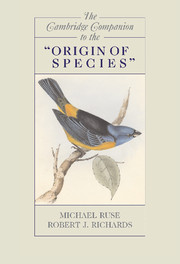Book contents
- Frontmatter
- Foreword
- Introduction
- 1 The Origin of the Origin
- 2 Darwin’s Analogy between Artificial and Natural Selection in the Origin of Species
- 3 Variation and Inheritance
- 4 Darwin’s Theory of Natural Selection and Its Moral Purpose
- 5 Originating Species: Darwin on the Species Problem
- 6 Darwin’s Keystone: The Principle of Divergence
- 7 Darwin’s Difficulties
- 8 Darwin’s Geology and Perspective on the Fossil Record
- 9 Geographical Distribution in the Origin of Species
- 10 Classification in Darwin’s Origin
- 11 Embryology and Morphology
- 12 Darwin’s Botany in the Origin of Species
- 13 The Rhetoric of the Origin of Species
- 14 “Laws impressed on matter by the Creator”? The Origin and the Question of Religion
- 15 Lineal Descendants: The Origin’s Literary Progeny
- 16 The Origin and Political Thought: From Liberalism to Marxism
- 17 The Origin and Philosophy
- 18 The Origin of Species as a Book
- Bibliography
- Index
18 - The Origin of Species as a Book
Published online by Cambridge University Press: 28 January 2009
- Frontmatter
- Foreword
- Introduction
- 1 The Origin of the Origin
- 2 Darwin’s Analogy between Artificial and Natural Selection in the Origin of Species
- 3 Variation and Inheritance
- 4 Darwin’s Theory of Natural Selection and Its Moral Purpose
- 5 Originating Species: Darwin on the Species Problem
- 6 Darwin’s Keystone: The Principle of Divergence
- 7 Darwin’s Difficulties
- 8 Darwin’s Geology and Perspective on the Fossil Record
- 9 Geographical Distribution in the Origin of Species
- 10 Classification in Darwin’s Origin
- 11 Embryology and Morphology
- 12 Darwin’s Botany in the Origin of Species
- 13 The Rhetoric of the Origin of Species
- 14 “Laws impressed on matter by the Creator”? The Origin and the Question of Religion
- 15 Lineal Descendants: The Origin’s Literary Progeny
- 16 The Origin and Political Thought: From Liberalism to Marxism
- 17 The Origin and Philosophy
- 18 The Origin of Species as a Book
- Bibliography
- Index
Summary
Varieties and variation were the keys to Darwin’s theory of evolution by means of natural selection - barnacles and pigeons - and varieties and variations are the keys to our understanding of the Origin of Species as a book.
The three largest collections of editions of the Origin are the Kohler Collection held by the Natural History Museum in London; a collection assembled by R. B. Freeman at the Thomas Fisher Library of the University of Toronto; and the books collected by Warren Mohr, Jr., now in the Henry E. Huntington Library in San Marino. Anyone wanting to study the Origin as a book needs to have close by a copy of R. B. Freeman’s The Works of Charles Darwin: An Annotated Bibliographical Handlist in its second edition. With all its faults and quirks, it is indispensable.
On November 24, 1859,On the Origin of Species by Means of Natural Selection, or the Preservation of Favoured Races in the Struggle for Life was published by John Murray on heavy cream-coloured stock from Spalding, printed by W. Clowes and Sons and bound by Edmonds & Remnant, London, in green cloth with gilt blocking on the spine. John Murray had held a trade sale on November 22 when orders were taken for copies from booksellers, wholesalers, and circulating libraries. Twelve hundred and fifty copies had been printed and bound. Of those, 5 were sent to Stationers' Hall; 12 were “allowed Author”; and 41 were “Presented Reviews” leaving 1,192 for sale (National Library of Scotland (NLS) Acc 12604/570/158).
- Type
- Chapter
- Information
- The Cambridge Companion to the 'Origin of Species' , pp. 333 - 352Publisher: Cambridge University PressPrint publication year: 2008



